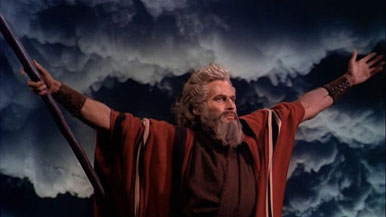Classic Movie Review:
The Ten Commandments (1956)
By Josh Spiegel
April 10, 2009
With Easter coming on Sunday, Passover already here, and everyone in such a festive mood, are you ready to sit through a 220-minute epic about the life and times of Moses, the most famous man to part the Red Sea? Make that the only man to part the Red Sea, but you get my drift. Yes, I'm talking about the 1956 religious classic The Ten Commandments.
Epics are very rare these days; in fact, the last major series of epic films came from Peter Jackson's adaptation of the Lord of the Rings book series. Before that came the 1997 box office champ Titanic. Despite those incredibly popular films, the epic is not a normal movie Hollywood makes anymore, mostly because the cost would be ridiculous and most people are hard-pressed to sit still through a movie that goes longer than three hours. Back in the first golden age of cinema, however, epics were almost a dime a dozen. So, in theory, having a bombastic director like Cecil B. De Mille and an equally fiery star like Charlton Heston is a great pairing for a wide-ranging story like The Ten Commandments. In theory, though, lots of things should work, like the New York Mets' bullpen or a fourth Indiana Jones movie. The Ten Commandments, while aiming very high, fell kind of short for me.
And, yes, I'm one of the presumably few who've never sat down for this religious drama over many Easters. Oh, I've tried; I clearly remember sitting down when ABC showed Ten Commandments one April long ago. Unfortunately, I tuned out just around the time the opening credits ended. That sounds a bit impatient on my part, but in sitting down to watch the movie, I discovered that ten minutes had elapsed by the end of those credits, what with the overture, a three-minute introduction by De Mille himself, and the long, long opening credits.
What happens after those credits is, by and large, somewhat impressive and just a bit too much. Even though Ten Commandments is over 50 years old, it's hard to argue about the awe-inspiring special effects, especially during the climactic parting of the Red Sea. Yes, it's obvious that Heston isn't actually anywhere near those parted waters, but this sequence is arguably one of the milestones in film technology. Also worth noting are the sumptuous sets and costumes, the scope of some of the film's extras-encompassing sequences (seriously, there are either millions of people in this movie or lots and lots of props), and the overall flamboyant nature of the entire proceedings.
All of this is my kind way of saying that I really didn't enjoy The Ten Commandments. Part of it's simple: I'm just not a very religious-minded person. Also, this is the type of movie that a person sees usually because they want to, are shown it in school, or are made to see it by family. Unlike most modern films, The Ten Commandments isn't a movie that you see at the multiplex because it's just been too long since you saw one of those good old-fashioned epics. An epic like this just doesn't work very well, specifically in the acting and directing style. For De Mille, more is more. Not only do we need more actors, we need more from the actors. Almost everyone in this movie gives the most over-the-top performance possible. Only Heston and Yul Brynner (as the Pharaoh Rameses II) pull off being so theatrical in their gesturing, posturing, and line delivery. Other actors, such as John Derek, Anne Baxter, and Edward G. Robinson, don't fare so well and are fairly laughable in their various portrayals.
Continued:
1
2

![]() Tweet
Tweet
![]() Print this column
Print this column



